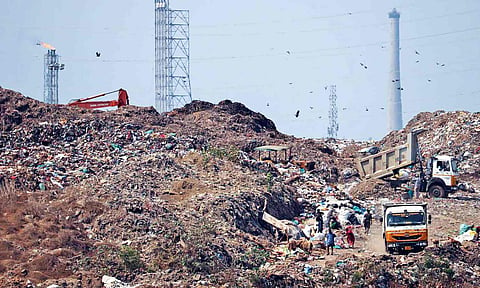

CHENNAI: As an alternative to the proposed waste-to-energy (WtE) incinerator project in Kodungaiyur dumpyard, the Federation for North Chennai Residents Welfare Association has submitted the Green Chennai Initiative (GCI), a comprehensive plan to transform Chennai into India’s first people-centric zero-waste city.
The proposal advocates a decentralised, inclusive, and climate-resilient approach to waste management that prioritises composting, recycling, and public participation over incineration.
TK Shanmugam, president of the Federation, said that the initiative was developed following a request from Mayor Priya to explore sustainable alternatives to the WTE plan, which involves burning municipal waste to generate electricity. “We’ll be submitting our proposal to the Mayor at Ripon Building on Monday afternoon,” he said.
At present, Chennai generates approximately 7,600 tonnes of municipal solid waste (MSW) every day, of which 5,160 tonnes/day (68%) is biodegradable. “The GCI outlines a detailed wet waste management framework that begins at the household level and scales up through neighbourhood and city-wide infrastructure,” he said. “Source segregation of waste will be made compulsory across the city.”
Shanmugam said that through GCI, wet waste would not reach the dumpyard, and instead, it would be handled at the division level. “At least 30% of the wet waste can be handled at the source level, including apartments, malls, hotels, party halls and individual homes through creating sustained awareness among residents to compost and generate biogas. Kerala follows this model, which can be replicated here. They should be incentivised by providing some amount of discounts in the property tax payment,” he said.
Under GCI, it proposes to set up 302 micro-composting centres (MCCs) managing 1,510 tonnes/day, 120 decentralised biogas plants handling 600 tonnes/day, and 20 centralised compressed biogas (CBG) plants, each with a 100-tonne capacity, collectively managing 2,000 tonnes/day. “This system aims to process the entirety of Chennai’s wet waste at source, thereby reducing dependency on landfills and transport-intensive disposal methods,” pointed out Shanmugam.
Dry waste, which comprises 2,300 tonnes daily, will be handled through decentralised materials recovery facilities (MRFs), each capable of sorting 50 tonnes. These centres will function as hubs for aggregation and linking recyclables to the formal recycling industry. Domestic hazardous waste, which accounts for 160 tonnes, will be processed through 15 specialised hazardous waste facilities.
The initiative also proposes the establishment of a Zero Waste Institute in Chennai to analyse residual waste and recommend upstream interventions such as redesigning non-recyclable products and phasing out materials like multi-layered plastics and plastic-lined paper cups.
Rejecting the proposed WtE incinerator at Kodungaiyur, Shanmugam said: “Burning 2,300 tonnes of dry waste would generate 500 tonnes of toxic ash, and its disposal would impact the environment.”
In its place, the GCI suggests developing the site as a model for transitioning it as an eco-park and a multidisciplinary learning centre with a massive library and free accommodation for those preparing for the civil service, Group I and II. “Turning the dumpyard into a facility for youngsters to study will be a natural justice for the neglected north Chennai,” Shanmugam opined.